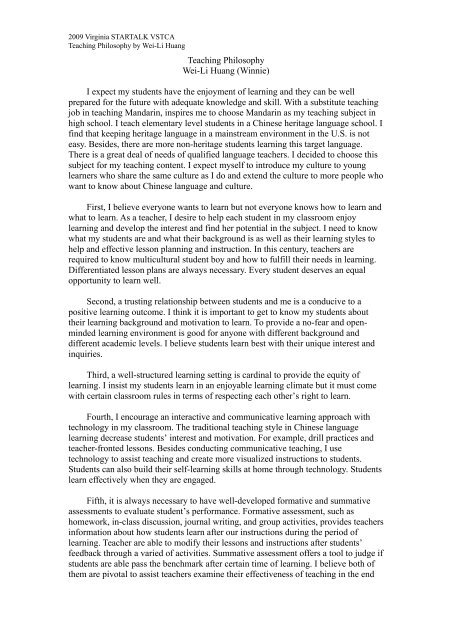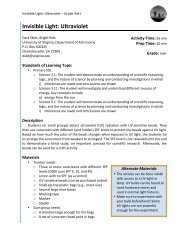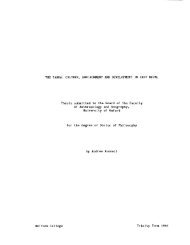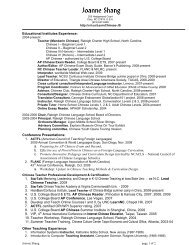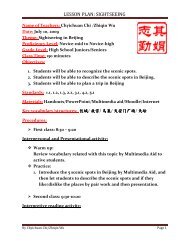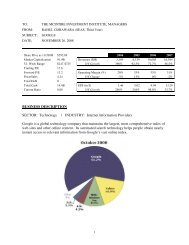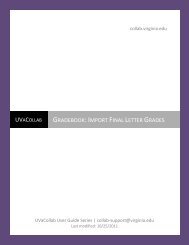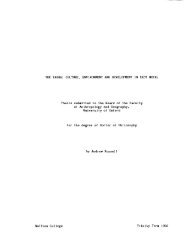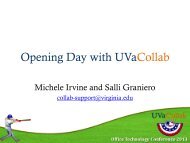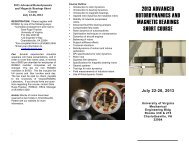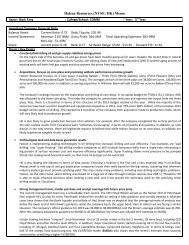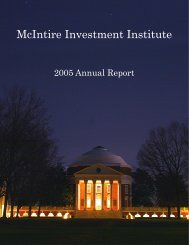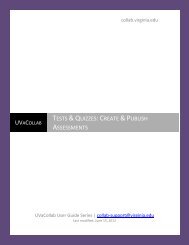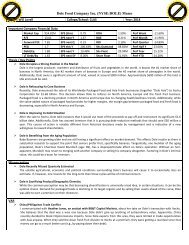Teaching Philosophy Wei-Li Huang (Winnie) I expect my students ...
Teaching Philosophy Wei-Li Huang (Winnie) I expect my students ...
Teaching Philosophy Wei-Li Huang (Winnie) I expect my students ...
Create successful ePaper yourself
Turn your PDF publications into a flip-book with our unique Google optimized e-Paper software.
2009 Virginia STARTALK VSTCA<br />
<strong>Teaching</strong> <strong>Philosophy</strong> by <strong>Wei</strong>-<strong>Li</strong> <strong>Huang</strong><br />
<strong>Teaching</strong> <strong>Philosophy</strong><br />
<strong>Wei</strong>-<strong>Li</strong> <strong>Huang</strong> (<strong>Winnie</strong>)<br />
I <strong>expect</strong> <strong>my</strong> <strong>students</strong> have the enjoyment of learning and they can be well<br />
prepared for the future with adequate knowledge and skill. With a substitute teaching<br />
job in teaching Mandarin, inspires me to choose Mandarin as <strong>my</strong> teaching subject in<br />
high school. I teach elementary level <strong>students</strong> in a Chinese heritage language school. I<br />
find that keeping heritage language in a mainstream environment in the U.S. is not<br />
easy. Besides, there are more non-heritage <strong>students</strong> learning this target language.<br />
There is a great deal of needs of qualified language teachers. I decided to choose this<br />
subject for <strong>my</strong> teaching content. I <strong>expect</strong> <strong>my</strong>self to introduce <strong>my</strong> culture to young<br />
learners who share the same culture as I do and extend the culture to more people who<br />
want to know about Chinese language and culture.<br />
First, I believe everyone wants to learn but not everyone knows how to learn and<br />
what to learn. As a teacher, I desire to help each student in <strong>my</strong> classroom enjoy<br />
learning and develop the interest and find her potential in the subject. I need to know<br />
what <strong>my</strong> <strong>students</strong> are and what their background is as well as their learning styles to<br />
help and effective lesson planning and instruction. In this century, teachers are<br />
required to know multicultural student boy and how to fulfill their needs in learning.<br />
Differentiated lesson plans are always necessary. Every student deserves an equal<br />
opportunity to learn well.<br />
Second, a trusting relationship between <strong>students</strong> and me is a conducive to a<br />
positive learning outcome. I think it is important to get to know <strong>my</strong> <strong>students</strong> about<br />
their learning background and motivation to learn. To provide a no-fear and openminded<br />
learning environment is good for anyone with different background and<br />
different academic levels. I believe <strong>students</strong> learn best with their unique interest and<br />
inquiries.<br />
Third, a well-structured learning setting is cardinal to provide the equity of<br />
learning. I insist <strong>my</strong> <strong>students</strong> learn in an enjoyable learning climate but it must come<br />
with certain classroom rules in terms of respecting each other’s right to learn.<br />
Fourth, I encourage an interactive and communicative learning approach with<br />
technology in <strong>my</strong> classroom. The traditional teaching style in Chinese language<br />
learning decrease <strong>students</strong>’ interest and motivation. For example, drill practices and<br />
teacher-fronted lessons. Besides conducting communicative teaching, I use<br />
technology to assist teaching and create more visualized instructions to <strong>students</strong>.<br />
Students can also build their self-learning skills at home through technology. Students<br />
learn effectively when they are engaged.<br />
Fifth, it is always necessary to have well-developed formative and summative<br />
assessments to evaluate student’s performance. Formative assessment, such as<br />
homework, in-class discussion, journal writing, and group activities, provides teachers<br />
information about how <strong>students</strong> learn after our instructions during the period of<br />
learning. Teacher are able to modify their lessons and instructions after <strong>students</strong>’<br />
feedback through a varied of activities. Summative assessment offers a tool to judge if<br />
<strong>students</strong> are able pass the benchmark after certain time of learning. I believe both of<br />
them are pivotal to assist teachers examine their effectiveness of teaching in the end
2009 Virginia STARTALK VSTCA<br />
<strong>Teaching</strong> <strong>Philosophy</strong> by <strong>Wei</strong>-<strong>Li</strong> <strong>Huang</strong><br />
of semester.<br />
Sixth, I keep <strong>my</strong>self accessible, as well as the learning material, to <strong>students</strong>. The<br />
ultimate goal of teaching is to assist <strong>students</strong> to explore their potentials and develop<br />
their thinking skills and research ability to establish a life long learning skills. The<br />
knowledge base is growing immensely over the past century. I hope, through <strong>my</strong><br />
teaching, <strong>my</strong> <strong>students</strong> can explore much more than they find in the classroom after<br />
they leave <strong>my</strong> classroom.<br />
Last but not least is to reach the goal of teaching—to improve <strong>students</strong>’ learning.<br />
It is necessary for teachers to reflect themselves in daily teaching. To have colleagues<br />
to work as a team to locate problems and see the solution in teaching is very effective<br />
to maintain and furbish the professional to both novice and seasoned teachers in this<br />
eternal learning career.


